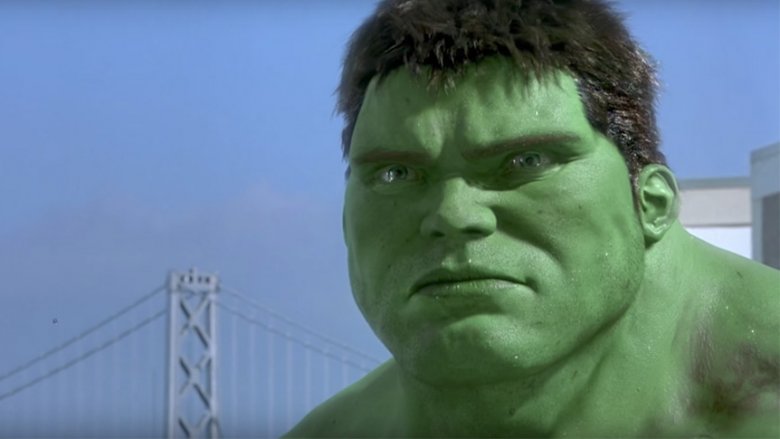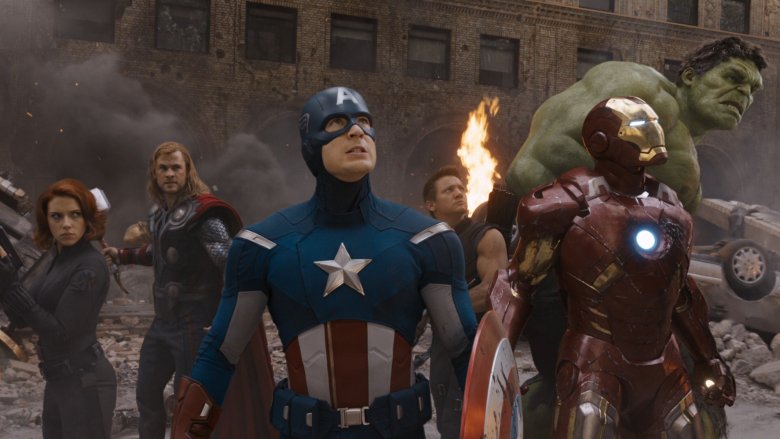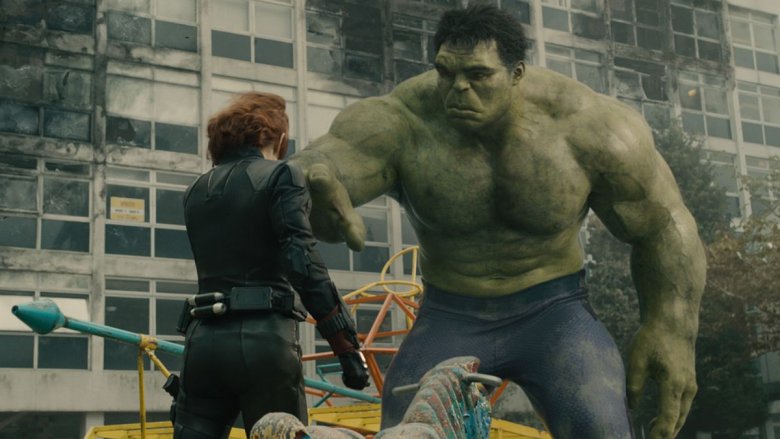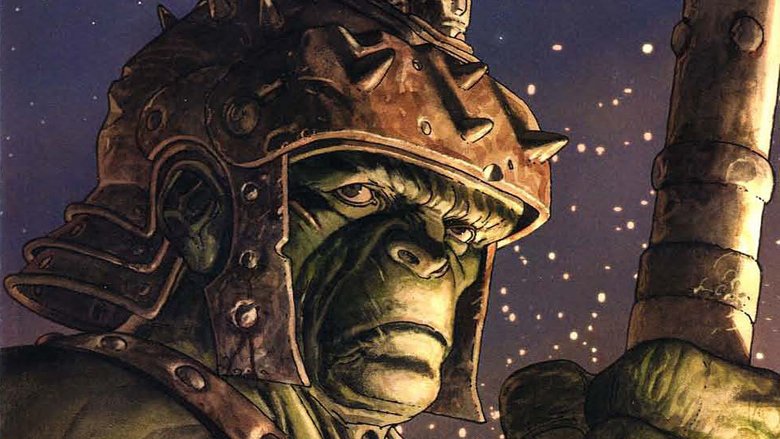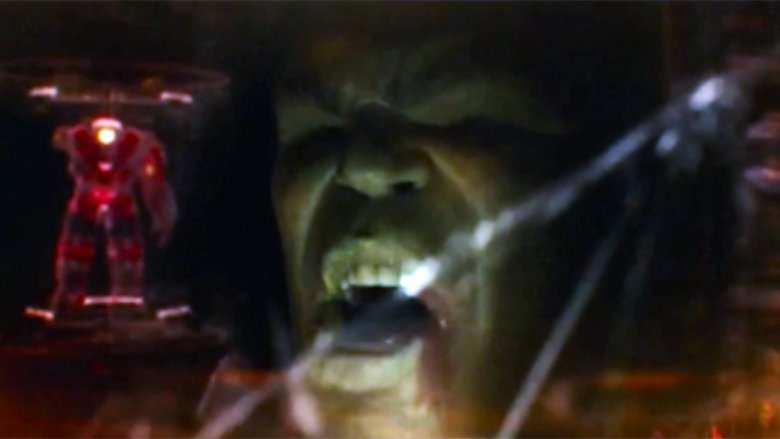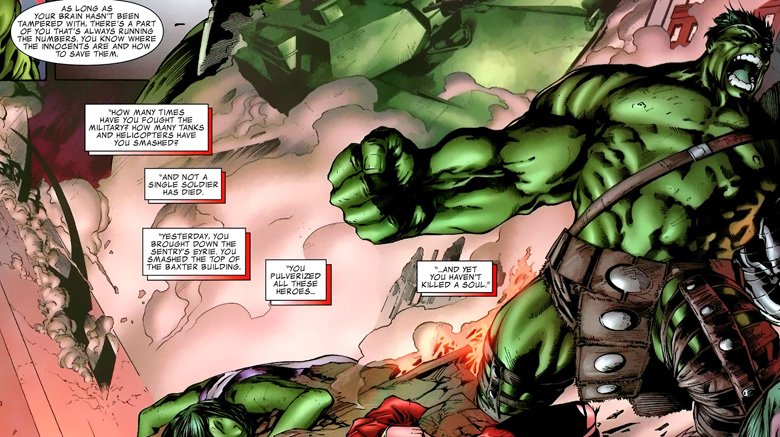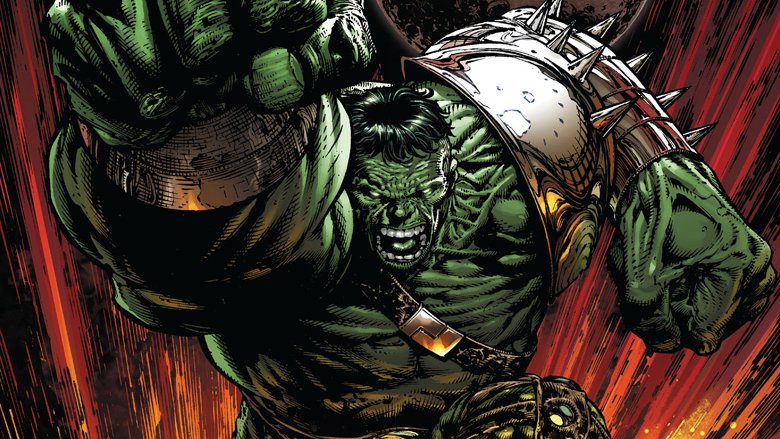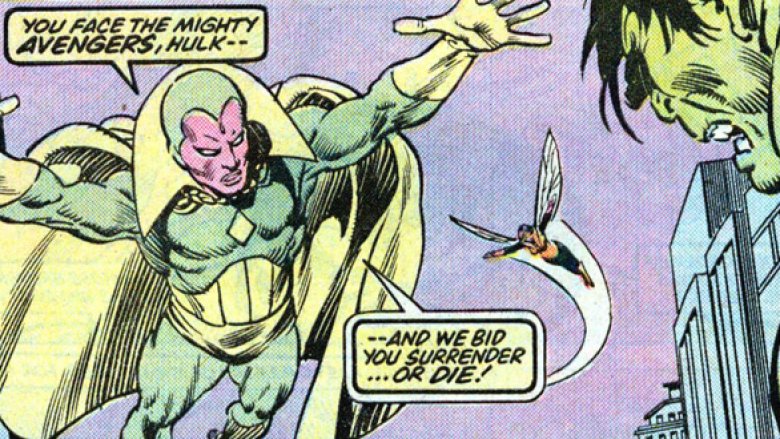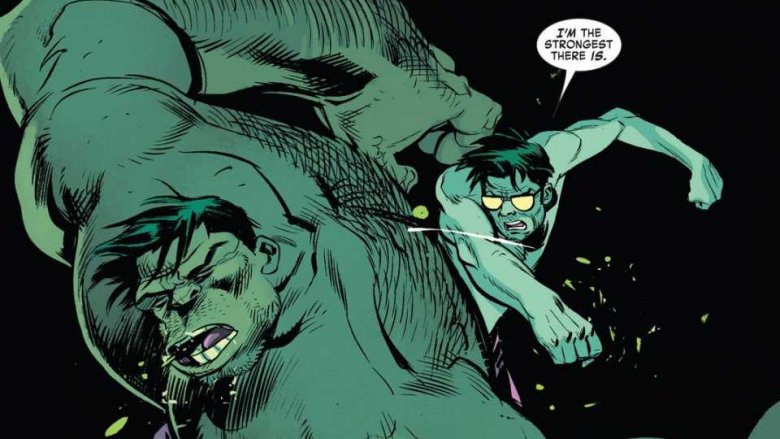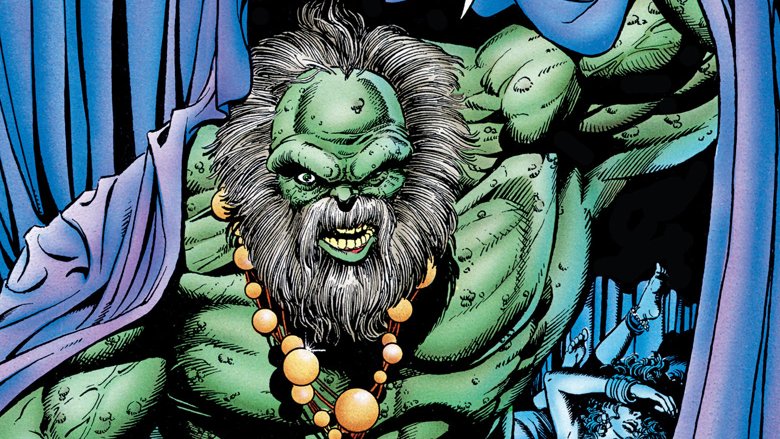Everything We Know About The New Hulk MCU Trilogy
The Incredible Hulk is easily one of Marvel's most recognizable characters. He's an easy concept to grasp, a sci-fi spin on Dr. Jekyll and Mr. Hyde, where a mild-mannered genius turns into a giant green brute who gets infinitely stronger when he gets angry — and he's always angry. He was even Marvel's first live-action success, leaping out of the comics and into a five-season television show that made him a pop culture icon. And yet, his path to cinematic success hasn't quite been the — wait for it — smashing success you might think.
Now, however, Marvel Studios is beefing up Bruce Banner's role in their cinematic universe with an arc that's playing out over the course of three movies, starting in Thor: Ragnarok and continuing through the next two Avengers films. As for what shape that arc might take, that remains to be completely seen — but based on what we know and what's already transpired, we can certainly make a few guesses.
The story so far
If you're wondering why the Hulk's arc is taking place in team-up pictures and other heroes' movies instead of a standalone film, it's the same reason we're not likely to see Wolverine show up for Infinity War: rights issues. During the press tour for Avengers: Age of Ultron, Mark Ruffalo mentioned that while they can certainly use the character, Marvel Studios can't make a movie that puts his name in the title. Those rights still belong to Universal... for now.
But at the same time, it also raises the question of whether they'd actually want to. There have already been two Hulk movies, and despite the fact that they were building off a character that had way more recognition than, say, Iron Man did before the launch of those movies — and who was infinitely more popular than surprise hits like Star-Lord and Rocket Raccoon — neither of them really set the world on fire.
Ang Lee's 2003 Hulk movie was, to put it nicely, a bit of a mess, and despite pulling off some pretty interesting visuals that played with comic book-style panel layouts (and having the Hulk punch out Hulk-Dogs, which was hilarious), it's also a movie that ends with a giant CGI monster having a fistfight with a cloud. 2008's Incredible Hulk, starring Edward Norton, was equally messy, a half-reboot, half-sequel that, despite being the second film in Marvel's shared universe, is also the one that nobody really remembers or talks about.
Enter: the Avengers
When the Hulk showed up in 2012's The Avengers, however — now played by Mark Ruffalo, who's been in the role ever since — it was definitely memorable.
That movie provided Bruce Banner with two of the most iconic Hulk moments of all time in any medium: Ruffalo turning to smile sadly at Captain America and tell him that he's always angry, and the unforgettable scene when he grabs Loki by the legs and smashes him into the floor until he can't stand up. The idea that the Avengers had to beat the army of invading aliens, but Hulk was the one who singlehandedly took down the villain, cemented his place as the MCU's heaviest hitter.
Maybe that's why he was the focus of so much of the sequel. Age of Ultron, despite being loaded up with new characters like Quicksilver, the Scarlet Witch, and the Vision, was as much a Hulk story as it was an Avengers story. He's the one who gets the pretty surprising romance angle with Black Widow, and who has the sad ending of flying off to Parts Unknown in the Quinjet — kind of an amped-up, superheroic take on the TV show's tradition of Hulk walking off to the next town while sad piano music plays.
The Hulk turns out to be a real team player
With two lackluster features and two ensemble movies in which he provided some of the best parts, it's easy to reason that the Hulk might just work better in the context of stories that feature other heroes — especially if there's legal red tape that's preventing another starring role anyway.
That's not to say that there aren't great solo Hulk stories in the comics that the filmmakers could draw from, though, because there are plenty. That said, it's also true that some of the most memorable moments in the history of the character come from stories where he's either pitted against other heroes, or where he gets really, really weird. Seriously: that dude has been a Conan-style barbarian king twice, on two different planets, and those stories are generally regarded as some of the best Hulk tales of all time.
Which brings us back around to Ragnarok.
Ragnarok and Planet Hulk
According to Ruffalo, Thor: Ragnarok kicked off his three-movie arc, and it's easy to see where Taika Waititi and Marvel Studios got their starting point: Greg Pak and Carlo Pagulayan's Planet Hulk, which might actually be the best-regarded Hulk story of the 21st century so far.
Published from 2006 to 2007, Planet Hulk tells the story of Hulk being stranded on an alien world that, for a little while at least, saps him of his strength. He's forced to become a gladiator, and eventually leads a revolution to overthrow the evil Red King, taking over the planet, finding love, and, as you might expect, setting up a tragedy that motivates his return to Earth and the next phase of his adventures.
The entire middle section of Ragnarok pulls heavily from this story. Characters like Korg and Miek, the planet Sakaar and its brutal contests, and even Hulk's Roman-inspired gladiatorial gear are lifted directly from the comics. The only big difference is that in the comics, the Marvel superhero who shows up for a guest appearance as an opponent in the arena isn't Thor — it's the Silver Surfer, who, ironically enough, hasn't been able to appear in the MCU thanks to rights issues.
Infinity War
The second part of the trilogy came with Avengers: Infinity War. In Ragnarok, Banner was worried that turning into the Hulk again would leave him permanently transformed, but after suffering a brutal defeat at the hands of Thanos in Infinity War's opening scene, he was faced with the opposite problem. No matter how mad Banner got, the Hulk refused to come out.
One of the cooler results of that problem was that we got to see Banner in action, ironically suiting up in Iron Man's massive Hulkbuster armor in order to take on the Black Order. It also gave us a better look at Banner's relationship to the Hulk than we'd ever seen in the MCU — they were presented as two separate characters occupying the same body, frustrating each other and even arguing. The big question, though, is just why the Hulk refused to, well, Hulk up at all.
The simple answer is that he's afraid, but according to co-director Joe Russo, Hulk's real reason for sitting out most of the fight against Thanos is a little more nuanced. "People speculated whether there was some fear on the Hulk's part about having to face Thanos again," he mused on the Infinity War commentary track. "But I think ultimately it's that he's tired of playing hero to Bruce Banner."
If you want to get even more complicated, however, there's yet another possible reason for Hulk's reluctance to jump into the fight.
Hulk math
One relatively obscure (and, for fans, very controversial) piece of Marvel Comics continuity might have an impact on the Hulk's motivations here. Even though he's caused plenty of destruction, it's been mentioned in canon that the Hulk's many rampages have never actually resulted in anyone being killed, except when he was rendered completely mindless. The reason, according to a super-genius and occasional Hulk called Amadeus Cho, is that Banner's physicist brain is never quite gone, even when the Hulk is the dominant personality. Instead, it's working overtime, running calculations and subtly guiding actions to keep everyone relatively safe.
That's almost certainly more complex than what they're going for in the movies, but it does open up an interesting possibility: if the Hulk actually does have that kind of automatic intelligence, then it's possible that he knew the Mad Titan would win. Doctor Strange talks about seeing 14,000,000 potential futures and only finding a single one where the heroes are victorious. If the Hulk was doing similar calculations, it's easy to see why he wouldn't want to bother fighting.
Either way, it's set up a new dynamic. Usually, Hulk vs. Banner is a battle about Banner trying to suppress or control his transformations. If he's trying to actively encourage the Hulk to return, then we're faced with a whole new set of potential problems.
World War Hulk
Obviously, whatever happens next for the Hulk has more to do with how the sequel to Infinity War shakes out than anything else, including who manages to make it back to the land of the living. That said, the Banner/Hulk conflict is almost certainly going to be at the center of the next piece of the story. With that in mind, if they want to follow up on the events of Thor: Ragnarok, a story based on Planet Hulk, then there's one obvious choice. In the comics, the events of that story led directly to World War Hulk, in which the Hulk returned from Sakaar and beat the living hell out of... well, everyone.
It's an idea that sells itself, but there's a problem with using it as the basis for a movie at this point. Mainly that it just doesn't work with what we've seen so far.
Here's your spoiler warning for both the comics and the movies they influenced: the conflict of World War Hulk is set up when the planet Sakaar is destroyed, and the Hulk blames the secret cabal of heroes who shipped him off to space to begin with. In the movies, however, Hulk isn't tricked — he boards the Quinjet himself, and even continues his escape from Earth when Black Widow tries to bring him back. Besides, while the Hulk seemed to be living a pretty comfortable life on Sakaar, there's no real indication by the end of Ragnarok that he misses it — and even if he does, the movie's version isn't destroyed at the end.
Having the Hulk get mad at the Avengers (and Banner) for dragging him back to Earth and into their own conflicts rather than leaving him alone could be a really good way to invert that setup and get some conflict out of it, but again, it's not what the movies seem to be leading to. Unless... Unless...
Days of Rage
One comic that might be a far more likely bit of source material is "Days of Rage," a senses-shattering throwdown that took place in Incredible Hulk #300, by artist Sal Buscema and writer Bill Mantlo, whose name you might recognize as the co-creator of Marvel's unlikeliest movie star, Rocket Raccoon.
As the title implies, the basic idea of that issue is that the Hulk goes into an unstoppable rage-fueled rampage that finds him taking on the entire roster of Avengers, plus Doctor Strange and Spider-Man. Even Daredevil, Luke Cage, and Iron Fist make cameo appearances, although they're pretty unlikely to show up in a movie. The centerpiece of the issue is a brutal fight against Thor, and it ends with the Hulk being whisked by Strange's sorcery off into a cosmic adventure.
But here's the most interesting bit: while we've already seen Hulk take on Thor and Iron Man in previous movies, both of those fights were built at least partially around the other heroes trying to get the Green Goliath to turn back into his far more manageable alter ego. What sets "Days of Rage" apart, however, is that Banner's not really part of the equation. It's not the only time the Hulk fought the good guys, but in that story, he's pure rage with no human mind in control.
Banner vs. Hulk
Spoiler warning again: Toward the end of Ragnarok, once Thor has successfully returned Bruce Banner to his human form after two long years as a gamma-powered brute, the movie makes a big deal about how if he turns again, he may not ever be able to revert back to being Bruce Banner. Needless to say, this happens about 4.3 seconds before Banner turns back into the Hulk, presumably dooming himself to a permanent life as a monster who can't keep a pair of pants intact — and in Infinity War, of course, he has the opposite problem.
But what if all this is meant to set up an attempt to "cure" banner by separating him from the Hulk once and for all? It's something that's been done in the comics more than a few times, and given what happened with Tony Stark's last attempt at fixing a major problem, having that kind of experiment go tragically wrong would fit right in with the rest of the universe. From a filmmaking standpoint, there's an even bigger benefit, too: if you separate the Hulk from Bruce Banner, you actually give Mark Ruffalo something to do.
Don't get it wrong, Ruffalo's great as the Hulk, but playing a giant computer-generated monster with a limited vocabulary and exactly one emotion is a little limiting. It's when he's Banner that he really gets the chance to shine as an actor, and the bits and pieces that we see of Banner as a human, struggling with his anger and solving problems with his brain rather than his fists, are an underrated part of the MCU saga.
While he serves as a two-fisted brick on the team, Hulk's entire deal as a solo character revolves around a person dealing with himself. Separating them would help to underline that, and a purely raging Hulk would certainly provide a cinematic challenge. And, just like it has in the comics, recombining the two halves could give us a Hulk with Banner's brain, something that could work as a pretty interesting change for the next phase of movies, after years of seeing the big green brute in action.
The Maestro
Of course, if they really wanted to focus on Bruce Banner's dark side, they could always introduce the Maestro, an alternate future version of the Hulk created by Peter David and George Perez in Future Imperfect, probably the most highly regarded Hulk story of the 20th century. In that story, the core timeline's Banner — with his mind in control of the Hulk's big green body — heads off to an alternate future where he ruthlessly conquered the world and brutally murdered every other superhero in the Marvel universe. He'd make his way back, of course, but the threat of becoming an even bigger monster by combining Banner's smarts and the Hulk's strength has been hanging over his head ever since.
Admittedly, while the X-Men franchise has done, it, the MCU movies haven't really messed around with alternate timelines yet. That said, it's not actually out of the realm of possibility. Evil opposites and dystopian futures are standard tropes of the superhero genre, and since we're gearing up for a movie that's focused on a set of gems with the power to control time and space (and the rest of reality), it could happen.
After all, we never thought we'd see the Bi-Beast in a movie either, now did we?
Note: While the author of this piece has written for Marvel Comics, he has no inside knowledge of the films. When it comes to the movies, he's just a fan who's read a lot of comics.
